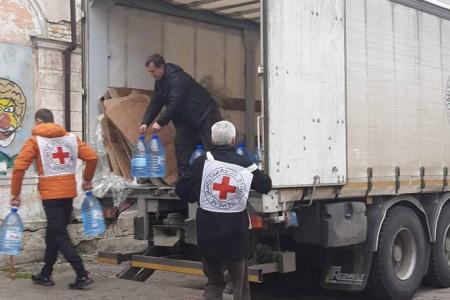Red Cross movement a reminder of importance of global cooperation
At a time when the global multilateral order is under stress, the International Red Cross and Red Crescent Movement is a reminder that it is possible to forge a path of global cooperation to tackle shared challenges, said Deputy Prime Minister Heng Swee Keat on Saturday (March 19).
He noted that the Singapore Red Cross (SRC) was actively involved in coordinating an international Covid-19 response, as well as providing support to communities hit by natural disasters and armed conflict, such as those in Malaysia, Haiti, the Philippines, Ukraine and Afghanistan.
"This spirit of global solidarity is an important value that Singapore holds dear," Mr Heng said.
"While we are a small country, we believe in playing our part in contributing towards building a better world."
Mr Heng, who is also Coordinating Minister for Economic Policies, was addressing business leaders, donors and the media at the Shangri-La Hotel during a forum organised by the SRC on the future of humanitarian action.
The world will continue to face new shared challenges and the humanitarian context will continue to evolve, he said, adding that global cooperation will be key in tackling challenges such as climate change, natural disasters and lack of access to food and water in many parts of the world.
"Unfortunately, the global multilateral order that has undergirded much of our peace and prosperity is under strain," the minister said.
"Support for globalisation has weakened, exacerbated by the strategic tensions between big powers.
"The ongoing armed conflict in Ukraine is destroying many lives and further putting the global order to the test."
Against this backdrop, the spirit of global partnership exemplified by the Red Cross and Red Crescent Movement will become all the more critical in the years ahead, Mr Heng said.
"It is important for the world to come together in the spirit of solidarity, to overcome our present and future challenges together.
"I look forward to SRC continuing to contribute to humanitarian efforts, and promote deeper understanding of our common humanity, both locally and internationally."
During the event, Mr Randy Lianggara, regional chief executive for insurance firm Aviva, made a personal donation of $120,000.
SRC chairman Tan Kai Hoe also spoke at the event, laying out the organisation's priorities beyond the Covid-19 pandemic.
He said Covid-19 will likely be followed by more crises ahead, such as new pandemics, natural disasters and the adverse effects of climate change.
"While these represent possible threats to the stability of our society, we should also view them as catalysts that challenge us to do better," Mr Tan said.
He added that the most vulnerable communities can become even more isolated and vulnerable during times of crisis, as recent natural and man-made humanitarian crises around the world have demonstrated.
There is a pressing need to strengthen local communities and make them more resilient, both in Singapore and abroad, he said.
To that end, the SRC will focus on three areas.
First, it will train more people in and around Singapore in first aid, life support, psycho-social support and mental well-being.
The aim is to keep societies strong even in the face of evolving threats, Mr Tan said.
Second, it will enhance emergency preparedness, response coordination and operational capabilities.
The SRC will bolster its own capabilities, as well as that of neighbouring countries, to respond to future disasters, Mr Tan said.
Third, it will invest in humanitarian innovations, including both equipment and systems.
Mr Tan said the SRC's Humanitarian Innovation Challenge, which was launched last year, will be extended to participants from South-east Asia.
The SRC will also have to tap the latest technology available to improve its humanitarian response, such as drones, he added.
Mr Tan also said there needs to be an integrated approach to facing humanitarian challenges, adding that the charity sector and social service agencies must leverage their collective strengths and complement each other's work by sharing resources and expertise.
Humanitarian and charitable organisations also need to mobilise the community's support to help fulfil various needs, through donations and volunteering, Mr Tan added.
"Even before the pandemic, the adequacy of funding has always been an issue within the humanitarian sector," he said.
"I expect the next few years may prove financially difficult for some charitable organisations."
Get The New Paper on your phone with the free TNP app. Download from the Apple App Store or Google Play Store now


